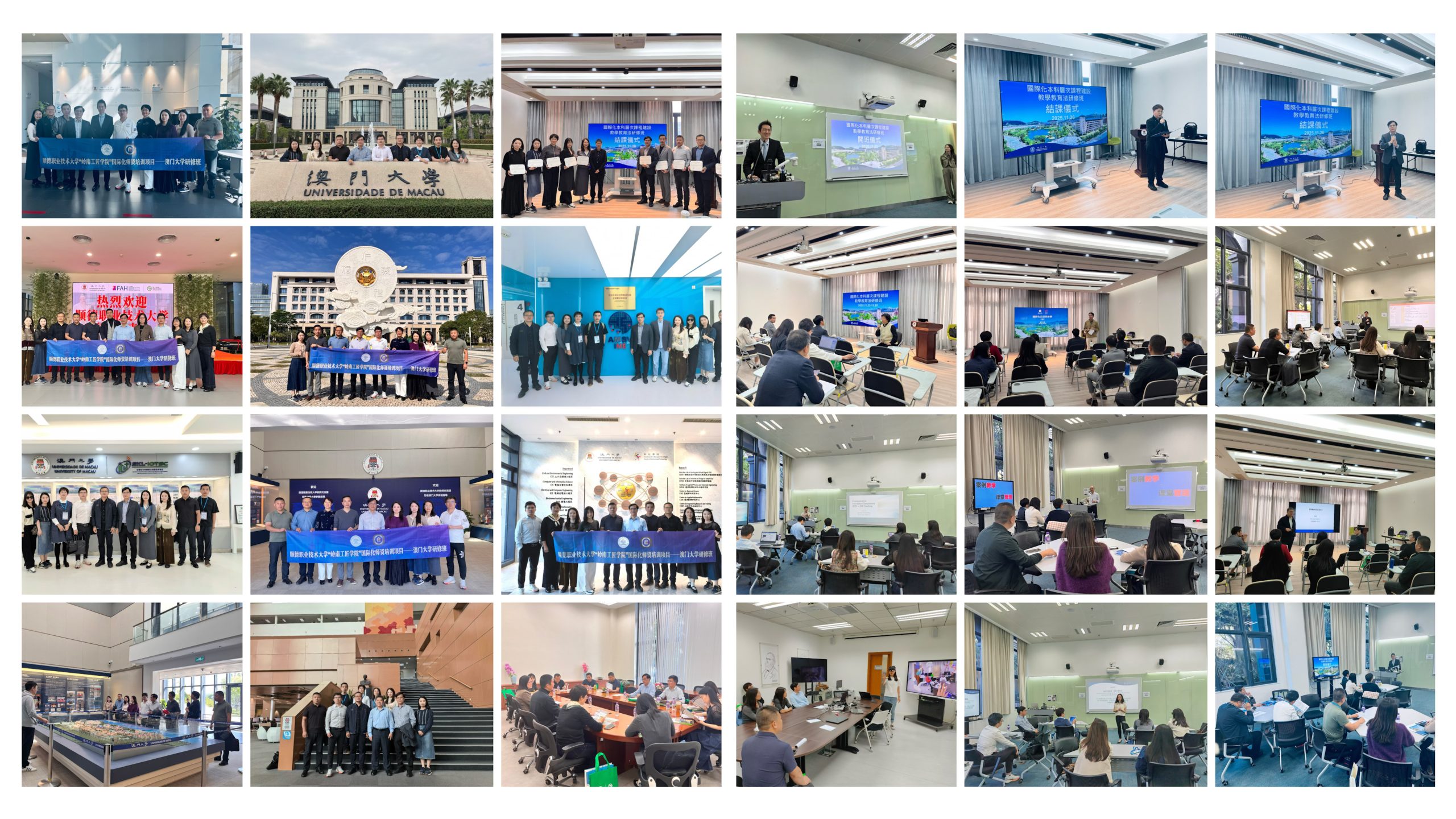CCE organizes a Training Program for the Second Batch of Core Teachers from Shunde Polytechnic University
澳大持續進修中心爲順德職業技術大學第二批骨幹教師舉辦國際化本科層次課程建設教學教育法研修班
澳大持續進修中心爲順德職業技術大學第二批骨幹教師舉辦國際化本科層次課程建設教學教育法研修班
澳門大學持續進修中心於2025年11月23日至26日為第二批來自順德職業技術大學的教師舉辦“國際化本科層次課程建設教學教育法研修班”。此次培訓班爲期四天,共10名骨幹教師參加,旨在通過系統的培訓,加強順職大教師在本科層次課程建設、公共基礎課教學法及國際化辦學等方面的能力,爲學校的高質量發展及國際化進程提供有力支撐。
研修班内容豐富,由澳門大學多位資深教授主講。培訓內容緊扣本科教育與國際化主題,涵蓋了教師課程建設及思政類課程建設方法、優化評估與激發創意的教學新視角、公共基礎課(中文、英語、數學、物理)教學法概論、國際語言中心建設方法,以及國際化交流與辦學等核心內容。培訓期間,教師們積極參與課堂討論,與授課專家就教學模式改革與國際化人才培養進行了深度互動交流,老師們均稱收穫頗豐,對本科層次的教學設計與國際化教育理念有了更深刻的認識。在校內參訪環節,老師們參觀了澳門大學展館、圖書館、模擬與混合信號超大規模集成電路全國重點實驗室、智慧城市物聯網全國重點實驗室、孔子學院以及應用數學研究中心。通過實地考察,老師們深入瞭解澳門大學在科研創新、學科建設及實驗室管理方面的先進經驗。
在課程結業禮上,順職大組織人事處(教師發展中心)處長陳文海表示此次研修受益良多,課程内容豐富,授課老師來自不同的學術背景和學科背景,既有宏觀的國際化辦學視野,又有具體的學科教學法分享。憑藉課堂交流和對國家重點實驗室的參訪,深刻體會到澳門大學嚴謹的學術氛圍與國際化辦學成果。之後將把此次研修班所學運用到今後的本科教學建設和管理工作中,積極探索適合學校發展的教學新路徑,爲學校的發展貢獻力量。
此次培訓班令兩校老師增進瞭解及溝通,加深認識兩地文化,加强粵港澳大灣區的教育合作及人才交流,未來計劃發展更多的合作項目。
CCE organizes a Training Program for the Second Batch of Core Teachers from Shunde Polytechnic University
The University of Macau (UM) Centre for Continuing Education (CCE) organized a “Training on Teaching and Education Methods for International Undergraduate Courses” for the second batch of faculty members from Shunde Polytechnic University from November 23 to 26, 2025. The four-day training programme, attended by 10 core faculty members, was designed to strengthen the capabilities of Shunde Polytechnic University’s teachers in undergraduate curriculum construction, pedagogy for public foundation courses, and internationalization, providing strong support for the university’s high-quality development and internationalization process.
The programme content was rich and led by several senior UM professors. The training focused closely on undergraduate education and internationalization, covering a wide range of topics such as faculty curriculum construction and methods for ideological and political courses, new teaching perspectives on optimizing assessment and inspiring creativity, pedagogical overviews for public foundation courses (Chinese, English, Mathematics, and Physics), methods for constructing international language centers, and international exchange and education. During the training, the participating faculty actively engaged in classroom discussions and had in-depth exchanges with expert instructors regarding teaching model reform and international talent cultivation. They reported significant gains from the programme, acquiring a deeper understanding of undergraduate instructional design and international educational philosophies. Moreover, the delegation visited the UM Gallery, the UM Library, the State Key Laboratory of Analog and Mixed-Signal VLSI, the State Key Laboratory of Internet of Things for Smart City, the Confucius Institute, and the Centre for Applied Mathematics. Through these field trips, the teachers gained deep insights into UM’s advanced experience in research innovation, disciplinary construction, and laboratory management.
At the programme’s closing ceremony, Chen Wenhai, Director of the Organization and Personnel Department (Teacher Development Center) at Shunde Polytechnic University, stated that the experience was highly beneficial. He noted that the course content was comprehensive and the instructors came from diverse academic and disciplinary backgrounds, offering both a macro vision of international education and specific sharing of disciplinary teaching methods. Through classroom exchanges and visits to the State Key Laboratories, he deeply appreciated UM’s rigorous academic atmosphere and achievements in internationalization. He plans to apply the knowledge gained to future undergraduate teaching construction and management work, actively explore new teaching paths suitable for his university, and contribute to its development.
This training programme has enhanced the understanding and communication between the faculty of the two universities, deepened their appreciation of each other’s cultures, and strengthened educational cooperation and talent exchange within the Guangdong-Hong Kong-Macao Greater Bay Area, with plans to develop more cooperative projects in the future.
